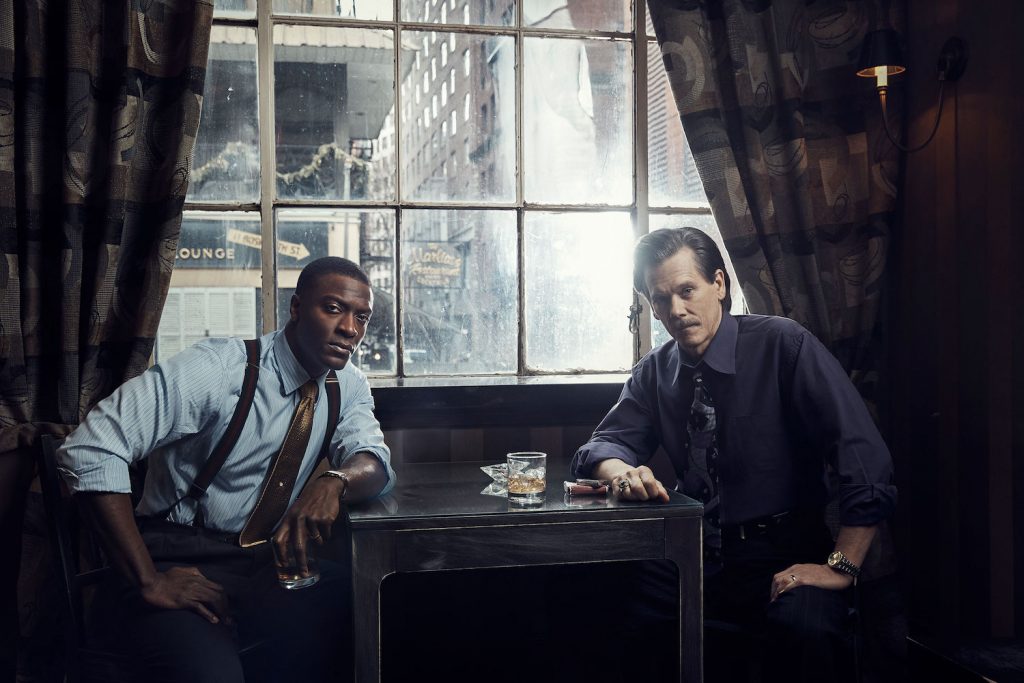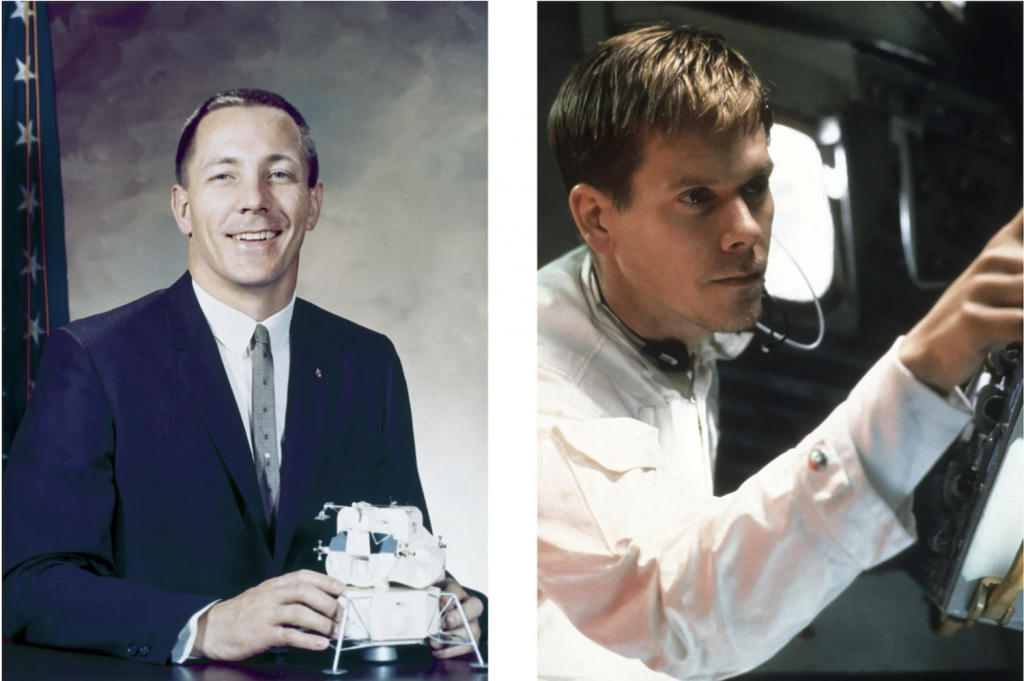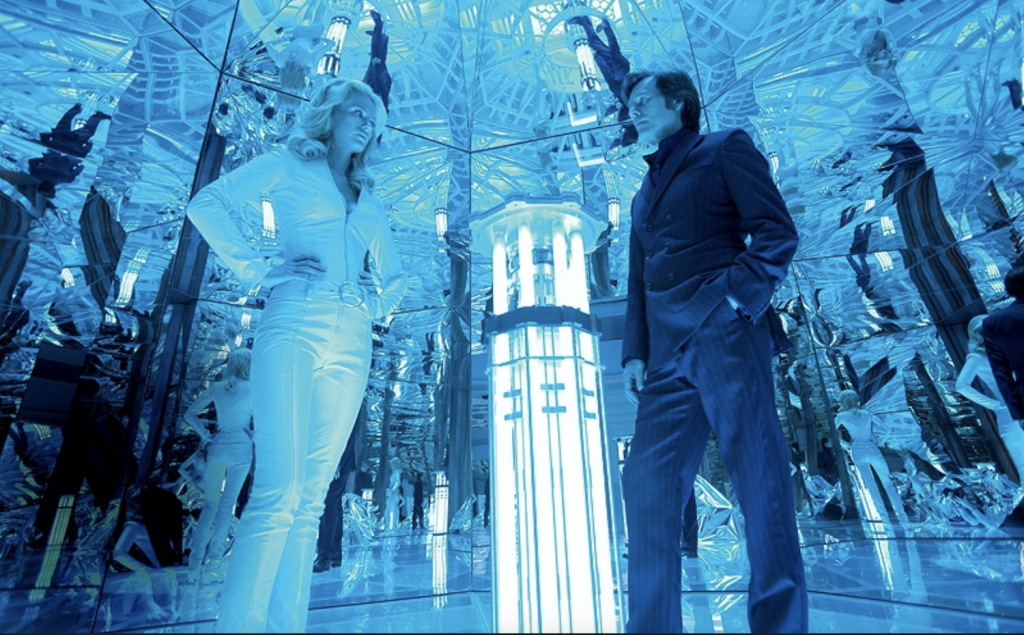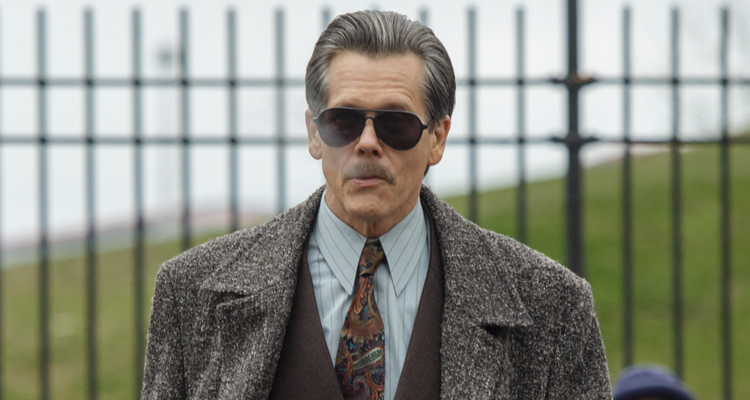With the season two premiere of Showtime’s crime drama series City on a Hill, audiences find FBI agent Jackie Rohr (Kevin Bacon) dumping an overdosing lover, who is the assistant U.S. attorney no less, at a hospital. This callous action of leaving her for dead is not altogether surprisingly for the troubled FBI Veteran.
Despite the flaws of his character, Kevin Bacon is incredibly compelling in a role that’s connected with audiences and critics. Having directed the premiere episode, Bacon found the synergy from season one alive and well. “I have a real sense of rhythm with the returning cast,” Bacon explains. “There’s a charity of spirit that has to do with laughing with one another.”
In its sophomore season, Showrunner Tom Fontana (Homicide: Life on the Street) tackles both police corruption and law enforcement distrust in the 1990s surrounding the Roxbury federal housing project in Boston.
Each season tackles a new Boston neighborhood, and this one is overrun with gang violence and drugs. So much so that Aldis Hodge’s morally upright Assistant DA must find a balance between his principles and getting results à la Bacon’s Jackie Rohr.
Going into his fourth decade in the entertainment business, the Golden Globe and SAG award winning actor shows no signs of slowing down. “I’m looking forward to going back out and playing music,” Bacon shares. “But right now the film work is picking back up which is really exciting for me.”
Bacon is one half of The Bacon Brothers, a band that he shares with his brother, Michael. Their catalogue of songs spans numerous genres with lyrics that blend humor, wit, and heart to great effect. If you attend one of their concerts, you’ll learn the origin story of their genre nicknamed debut album, “Forosoco.”
Bacon spoke to Awards Focus about the challenges of filming City on a Hill’s second season, his path to finding his character in Apollo 13, and memories from his mutant days as X-Men First Class turns a decade old.
Awards Focus: The show is very deliberate in controlling how far and how quickly the dial turns on the evolution of Jackie Rohr, and I was curious going into season two what were some things you were hoping to see and how did that play out for you, particularly with the emphasis on the family drama this year?
Kevin Bacon: Tom Fontana does this thing at the beginning of the season where he sits you down and you talk about things that you’re interested in exploring from a character standpoint, and I was certainly interested to see what was going to happen in mine and Jenny’s (Jill Hennessy) relationship.
Specifically, I wanted to see the thing that ultimately brought them together in the first place. In the first season Jackie’s just being an asshole, and it’s hard to imagine why Jenny would even want to stay, so I think we were interested in exploring the connection that holds them together a bit more, as well as taking a more intimate look at Jackie’s inner life.
When you look at a character like Jackie, who’s just so complicated and has so many dark pieces to his psyche… his moral code is so kind of bent, you think, ‘Well, how does somebody end up like that?’ We really got a chance in season two to explore that a little bit.
I also really liked the idea, which we touched on in the first season, of a man who is extremely terrified of losing his power. In this case, there’s a lot of ways that his power manifests itself; whether it’s his power at the FBI, political power, power with women, the power of being able to survive everything he’s doing to his body.
In season two, we start to see all these things crumble and you start to see Jackie’s real vulnerability underneath all of that. At some point everyone loses their power, right? We end up turning into children eventually; drooling away in diapers. That’s where we’re all heading (laughs). So that was something we wanted to explore.

(Photo Credit: Eric Ogden/SHOWTIME)
AF: You got to direct the premiere this season, and Jason Bateman, when he directs Ozark’s premieres, says that it’s a great way for everyone to find their rhythm again. I’m curious how you found that experience this year and if you would be open to directing again for the season three premiere?
Bacon: I’m not doing it for the season three premiere and it really is a question of timing for me. The reason that I directed the first episode is because I feel really strongly that a big part of what I like about directing is the prep.
You start to work with your DP, you start to work with casting, you find locations, you get yourself as ready as you possibly can to do it. That is a big part of the process for me, and if you’re already in the middle of shooting an episode and you have to run to do directing prep for another episode in between scenes, that isn’t a great experience from either the directing or the acting standpoint. So that’s why I wanted to direct the first episode.
It’s a good point that Jason makes, it really does get you back into the rhythm. I wanted to direct the first one, just so that I would be able to really spend the time with the prep, and for season three I wouldn’t have that luxury.
I think what we’re going to do in season three is similar to what we did post pandemic, which is that we shot two episodes before the ‘Ides of March’ as I like to call it, when everything shut down, and then we shot the remaining six with three different directors doing two episodes each.
AF: When you spoke about the post COVID filming, you said that it was very difficult to do the rehearsal with the mask on, because it’s limiting what you can give to your scene partner.
When you could finally take off the masks and film, did you find that it gave the scene a freshness that you didn’t get in rehearsal?
Bacon: Certainly with the new cast, but with Al (Aldis Hodge) and Jill (Hennessy) and the returning cast, I have a sense of them and their rhythms. I mean, with Al, I could work with him blindfolded, but with new people it definitely was like ‘Oh wow, now I can see what you’re doing, I’m looking at your face for the first time!’
In terms of crew, some people didn’t feel safe coming back, or their lives had changed, so it wasn’t all the same crew who came back to shoot. Some of the crew’s faces I never saw, which is sort of a strange thing because you also develop relationships with the crew.
There’s a charity of spirit that has to do with laughing with one another and learning about people’s lives outside of work, and all of that kind of went away.
We’ll see where the protocols are at by October. I’m hoping that the industry will have caught up to where we’re at in terms of the rest of the country, you know?
AF: Absolutely. When you read the pilot you said you could hear the voice and the rhythm of Jackie Rohr, which is always ideal. I was curious if there was a well known character from a film previously that came to you later in the process… someone tough to crack perhaps?
Bacon: Definitely, I can think of one right off the top of my head. I remember when I was doing Apollo 13, I knew it was a great script; I loved Ron (Howard), (Tom) Hanks, Bill (Paxton) of course.
I wanted to do this movie and tell this story, but I didn’t really have a handle on the guy, Jack Swigert. He’s a real guy and I sort of tried to find some video of him and talk to people, his family, you know?
I haven’t really played that many real people who were really famous. I’ve played real people but they were people who were not really famous, so in some ways you don’t have that pressure to create a great impression, but on the other hand there’s less material available to absorb so you can try and stay true to that person.
But I just didn’t quite have a handle on who this guy was, and then Ron said to me one day, ‘You’re the odd man out, you’re the third wheel, you’re the guy who ended up at the party, but who wasn’t originally invited.’
In the story, I was the alternate for that mission because Gary Sinise’s character gets sick. The other characters have more of a relationship with Gary’s character, and all of a sudden here comes this guy who wasn’t really invited to the party. That hooked it for me, and really gave me a place to start out. Everything else really branched out from there.

AF: Another great film which had its ten year anniversary this month is X-Men First Class. You were fantastic as Sebastian Shaw and I was curious if you recalled anything from the production, which was shot relatively quickly?
Bacon: Oh, I don’t remember it being quick at all! But maybe that’s because I haven’t done many comic book movies. I remember it taking forever. I had a great time doing it in London, and interestingly enough, I hadn’t spent much time in London up until then, but I’ve spent a lot of time in London since. It’s a great town for a New Yorker.
My whole career has been about playing real men. I don’t get the opportunity to wear tights very often, as I tend to play real, gritty people. So to get to play someone who’s a mutant and also to get the sense of this heightened reality, was fun for me.
Michael Fassbender and I spent a very long and intense scene in this mirrored room inside a submarine in the climax. The energy and intensity that we had was incredibly difficult because we were just looking at green everywhere… to keep up that kind of scene was a tremendous challenge under those conditions.
I also remember we went to shoot in Georgia because there was some stuff we had to do in a yacht. I remember January Jones was in this crazy outfit, with very little clothing, and everyone’s saying, ‘Oh boy, Georgia, you guys are going to be boiling.’ When we got on the boat, it ended up being so cold, and Michael was going in and out of the water in a wetsuit, but it was freezing.

AF: For City on a Hill season three, what are you really looking forward to exploring?
Bacon: It’s early, but I was just having a chat the other day with Fontana, about where the story’s going to go Jackie wise, and we were talking about how great it is at the end of season two when Jackie takes his badge and throws it into the Boston Harbor.
Now the question is, ‘What is he going to do with his life?’ We have some really interesting ideas about that. The whole concept of the show is that it moves from neighborhood to neighborhood, so I think we’ll be moving into a new area of Boston for season three, which is always exciting.
Byron Burton also contributed to this article.


